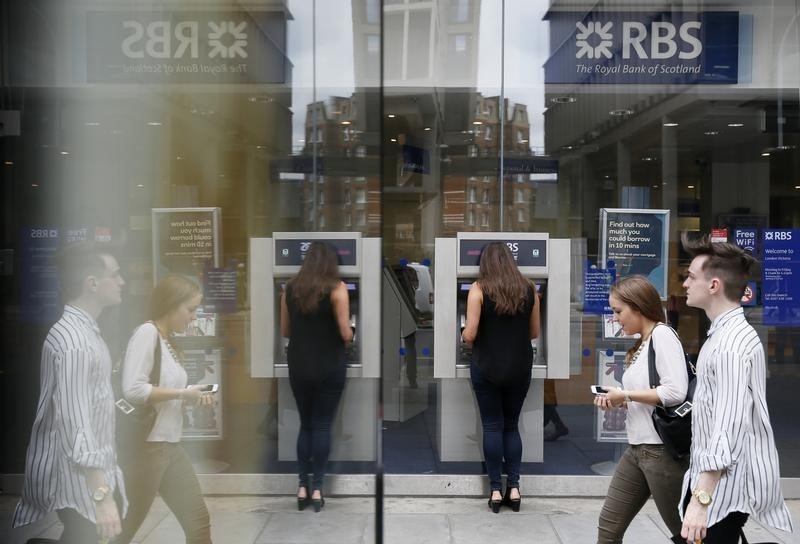By Matt Scuffham and Steve Slater
LONDON (Reuters) - State-owned Royal Bank of Scotland (RBS) (L:RBS) posted an unexpected profit in the second quarter, benefiting from write-backs on problem loans and boosting its stock ahead of an impending first sale of a chunk of the government's shares.
An RBS share sale, following successive disposals of government holdings in Lloyds Banking Group (L:LLOY), would mark another milestone in Britain's recovery since the 2007-2009 financial crisis and could contribute billions of pounds to state coffers.
Finance Minister George Osborne said earlier this month the Treasury planned to sell at least three-quarters of its 78 percent stake over the next five years and he was keen to kick off the process as soon as possible.
An initial sale to financial institutions, which will be at a loss on the average 502p per share price the government originally paid, is possible in the next few days, but more likely in September, sources familiar with government thinking said.
"The bank is in much better shape than it was even 12 months ago and it's given the government the confidence to say this is a bank that we can start selling off. The timing itself is up to the government," Chief Executive Ross McEwan told reporters.
Shares in RBS hit their highest in a month and were up 3.3 percent at 0720 GMT (0820 BST).
RBS reported a profit of 293 million pounds for the second quarter, up 27 percent on the year before, as economic recovery at home enabled it to recover loans that had been written off. Analysts had expected a loss of 260 million, according to forecasts provided by RBS.
REALISTIC EXPECTATION
The bank said it planned to return capital to shareholders by paying dividends or buying back shares, but would not be in a position to do so until the first quarter of 2017 at the earliest. Some analysts had expected a dividend next year.
"There were some analysts out there with expectations of capital distributions in 2016. We felt it was important to be transparent and to ground people in what we think is a realistic expectation," Finance Director Ewen Stevenson said.
McEwan is battling to turn round the bank, whose reputation has been hit by a number of scandals since it was rescued by the government at a cost of 45.8 billion pounds to taxpayers.
McEwan said in February RBS would dramatically shrink its investment banking operations and would pull out of 25 countries across Europe, Asia and the Middle East to refocus on Britain.
It took a charge of over 1 billion pounds during the period to cover the cost of the restructuring.
The bank is looking to clear a number of hurdles before returning capital, including impending settlements with authorities in the United States over claims it misled investors in mortgage-backed securities (MBS).
The bank has so far set aside 2.1 billion pounds to deal with the matter but some analysts believe the final bill could be much higher. Stevenson said RBS had not yet entered discussions with U.S. authorities, suggesting settlements are not imminent.
The bank said it had set aside 459 million pounds in the second quarter to deal with conduct and litigation issues, mainly to bump up its provisions for the MBS settlements.
